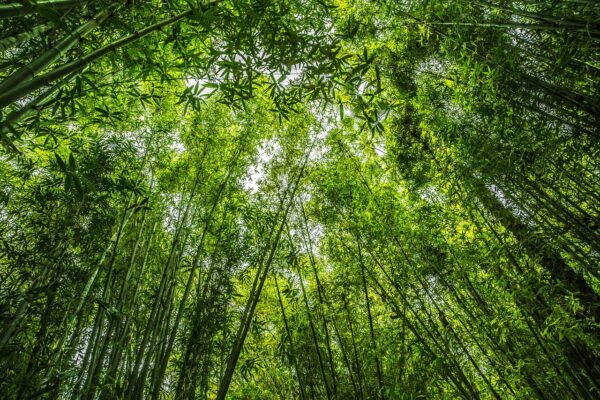The Wonders of Bamboo Trees: Nature’s Green Gold-by Kalani-eLanka

Bamboo trees are remarkable and versatile plants found in various parts of the world, particularly in tropical and subtropical regions. They belong to the grass family Poaceae, and despite their appearance as trees, bamboo is technically a grass. Bamboo’s fast growth, sustainability, and versatility make it one of the most useful plants on Earth. Let’s explore the many fascinating aspects of bamboo trees.
One of the most unique characteristics of bamboo is its rapid growth. Some species of bamboo can grow up to 91 cm (35 inches) per day, making it one of the fastest-growing plants in the world. This quality makes bamboo an excellent renewable resource. It can reach full maturity in just 3 to 5 years, compared to traditional trees, which can take decades.
Bamboo grows from a root system called rhizomes, which allows it to regenerate quickly without the need for replanting after harvesting. This ability to grow continuously makes bamboo an eco-friendly alternative to other wood sources, as it reduces deforestation.
Bamboo plays a significant role in environmental conservation. It absorbs a large amount of carbon dioxide and releases about 35% more oxygen compared to equivalent-sized trees. Bamboo forests help reduce greenhouse gases, combat climate change, and improve air quality.
The dense root network of bamboo also aids in preventing soil erosion by holding the soil together, especially in areas prone to landslides or flooding. In addition, bamboo requires very little water, making it ideal for regions affected by drought or water scarcity.
Uses of Bamboo
Bamboo’s versatility is incredible, with numerous applications across various industries:
- Construction Material: Bamboo is a strong, lightweight material often used in scaffolding, flooring, and even house construction in many parts of Asia. Its tensile strength rivals that of steel, making it highly durable for building purposes.
- Furniture and Handicrafts: Bamboo is popular for making furniture, baskets, and decorative items. Its flexibility and strength allow artisans to create intricately designed furniture and crafts that are both functional and aesthetic.
- Paper and Textiles: Bamboo fibers can be processed into soft textiles like bamboo fabric, which is known for being breathable and moisture-wicking. It can also be used to make paper, which is more sustainable than paper made from wood pulp.
- Food: In many Asian cuisines, young bamboo shoots are consumed as a delicacy. Bamboo shoots are rich in nutrients and are often stir-fried, pickled, or added to soups.
- Biofuel: Bamboo can also be used to produce biofuels, an environmentally friendly alternative to fossil fuels. Bamboo charcoal, for instance, is a sustainable energy source.
Bamboo has deep cultural significance in many societies, particularly in Asia. In countries like China and Japan, bamboo is a symbol of strength, flexibility, and resilience. It is often depicted in traditional art and literature as an embodiment of virtue, grace, and simplicity.
In Buddhism, bamboo represents the path to enlightenment, due to its hollow nature, symbolizing an open and humble mind. Many festivals and rituals incorporate bamboo, celebrating its importance in everyday life.
Despite its many benefits, there are challenges associated with bamboo cultivation. In some cases, non-native species of bamboo can become invasive, outcompeting local plants and altering ecosystems. Proper management is required to ensure bamboo is grown sustainably and does not negatively impact biodiversity.
Furthermore, while bamboo’s fast growth and utility make it an attractive crop, the commercialization of bamboo must be balanced with the need for responsible harvesting and cultivation practices to prevent over-exploitation.
Bamboo is truly a wonder of nature, offering solutions to environmental challenges while providing numerous economic and cultural benefits. As the world increasingly turns to sustainable resources, bamboo stands out as a green alternative for industries and individuals alike. Whether used for building, crafting, or simply admired for its beauty, bamboo is a plant that continues to shape both nature and human culture.





















